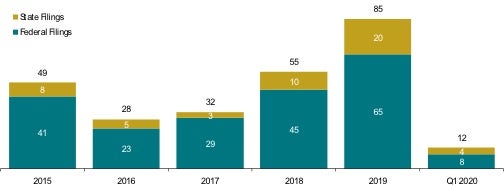Total tech company filings have increased steadily, from 28 filings in 2016 to a record high 85 in 2019.[i] Filings against tech companies accounted for 20 percent of total filings against both tech and non-tech companies over 2016–2019.
Tech company filings in federal courts increased 44 percent from 2018 to 2019. The number of 1933 Act tech company filings in state courts doubled.
The Internet and Software subsectors accounted for 66 percent of tech company filings in 2019.
State filings involving tech companies increased as a proportion of total filings in both state and federal courts, from 9 percent in 2017 to 18 percent in 2018 and 33 percent in Q1 2020. This shift in filings from federal to state courts is likely a consequence of the U.S. Supreme Court’s 2018 ruling that confirmed state courts’ jurisdiction over 1933 Act claims.[ii]
Since 2018, securities lawsuits involving tech companies have been filed in a variety of state courts, including California, New York, Nevada, Massachusetts, Pennsylvania, Florida, Georgia, and Colorado.
Tech company filing activity in Q1 2020 declined from 2019, likely due to slowdowns associated with the COVID-19 pandemic.
The pandemic’s impact on the market value of tech companies may be less severe than its effect on the overall market. While the S&P 500 declined by 20 percent during Q1 2020, the Dow Jones U.S. Technology Index lost 12 percent of its market value and the NASDAQ-100 Technology Sector lost 16 percent of its market value.[iii]
While the full impact of the COVID-19 pandemic on filing activity remains to be seen, there is potential for increased securities class action filings, including those against tech companies, based on the economic slowdown and operational issues associated with the pandemic.
Figure 1: Number of Tech Company Securities Class Action Filings 2015–Q1 2020

Source: Bloomberg BICS Manual; Cornerstone Research and Stanford Law School Securities Class Action Clearinghouse
Note: Dataset includes state and federal core filings from 2015 through Q1 2020. Tech companies are defined as those in the Computers, Internet, Semiconductors, Software, and Telecommunications subsectors according to the Bloomberg Industry Classification Systems (BICS).
Read more about Tech Company Securities Class Action Filings and Settlements--2015-Q1 2020 Review and Analysis.
Read Tech Company Securities Class Action Filings and Settlements—2015–Q1 2020 Review and Analysis
[i] Only core filings, which are all federal and state 1933 Act securities class actions excluding those defined as M&A filings, are considered in this report.
[ii] The U.S. Supreme Court ruled on March 20, 2018, in Cyan Inc. v. Beaver County Employees Retirement Fund that cases with 1933 Act claims may be brought to state venues and are not removable to federal court. See Cyan Inc. v. Beaver County Employees Retirement Fund, No. 15-1439, 583 U.S. ___ (2018), https://www.supremecourt.gov/opinions/17pdf/15-1439_8njq.pdf.
[iii] See “S&P 500 Index – Historical Quotes,” MarketWatch, https://www.marketwatch.com/investing/index/spx/historical; “Dow Jones U.S. Technology Index – Historical Quotes,” MarketWatch, https://www.marketwatch.com/investing/index/djustc/historical?countrycode=xx; “NASDAQ-100 Technology Sector Index,” Nasdaq, https://www.nasdaq.com/market-activity/index/ndxt/historical.




 />i
/>i
